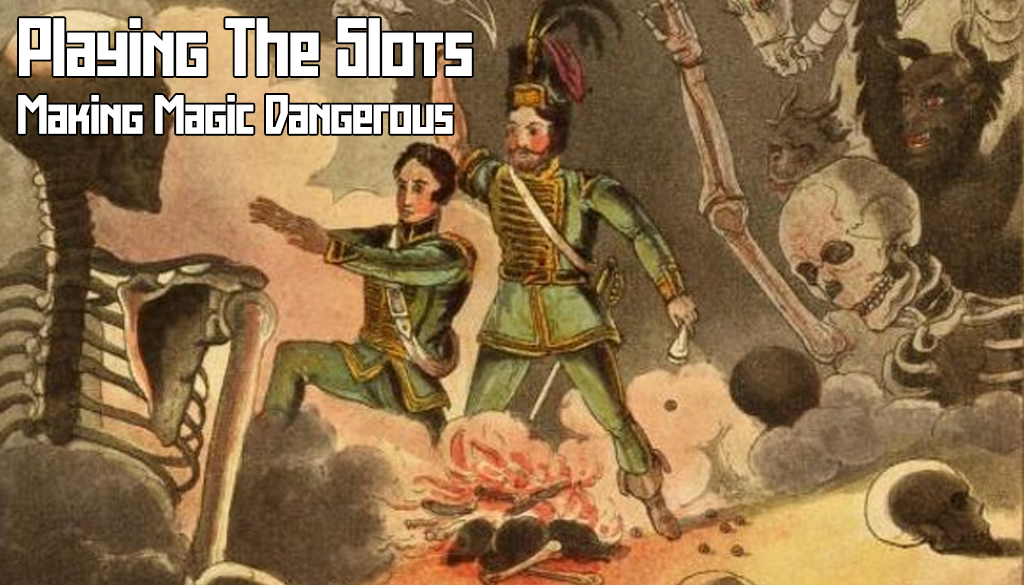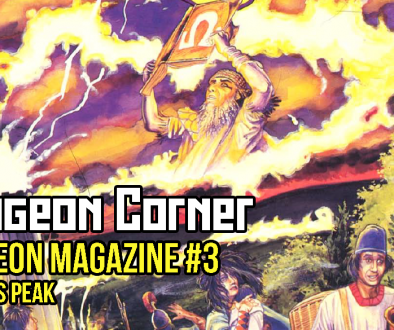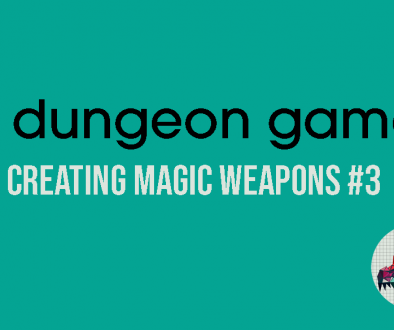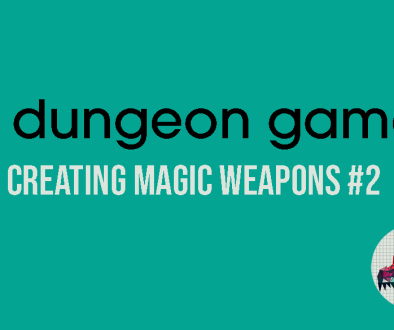Making Magic Dangerous
Dangerous Games
Magic is dangerous. When you interact with magic you’re twisting the fundamental laws of reality into unnatural shapes. You’re creating friction in the one space where friction should not exist. This should be scary, and mistakes should come with consequences.
We used to know this, sort of. In early editions of D&D spell failure was possible, though it largely just meant that the spell would fizzle without any effect. Thieves who can read scrolls also risk failure, with much more interesting and catastrophic results than failure on the part of a magic user:
this sort of malfunction is almost always detrimental to the thief and his party. It could be as simple as accidentally casting the reverse of the given spell or as complex as a foul-up on a fireball scroll, causing the ball of flame to be centered on the thief instead of its intended target. The exact effect is up to the DM (this is the sort of thing DMs enjoy, so expect the unexpected). [1]
Some more modern games still remember that magic is dangerous, a fool’s errand for most who tangle with it. Dungeon Crawl Classics tells us that “continued use of magic results in… changes” (pp. 116). Individual spells give unique results for spell failure, as well as misfire and corruption results specific to the spell. The Vanilla Game has a concise Miscast table that covers a lot of bases.
But the most popular version of the original dungeon game doesn’t care about spell failure, unless it’s the Wild Magic Sorcerer – and even then, effects only happen if the GM decides that the sorcerer should check for wild magic surges. It has nothing to do with the skill of the caster or the risk of meddling with powers beyond your control and everything to do with the whim of the GM and their ability to remember that actually yes this is a thing I should be doing.
We can do better.
What Is A Spell Slot?
Picture a spell as a liquid. A spell slot is a bottle to contain the liquid.
A third level spell slot is designed to contain exactly the volume of a third level spell. The smaller volume of a first or second level spell will fit with room to spare. The larger volume of a fourth or fifth level spell is too much. It won’t fit.
Except.
Some of that volume will fit. The rest will be left over. If you’re not careful as you transfer the volume from a fifth level slot to a third level slot, you’ll spill something.
Easy does it.
Making It Work
This should work for any game that uses the concept of “spell slots” in conjunction with “spell levels”, but I’m writing with Fifth Edition in mind simply because I’m familiar with it and it’s the game the majority of people are playing right now.
In Fifth Edition magic users can cast a spell with a slot of a higher level. Sometimes this increases the effectiveness of the spell. People refer to it as “upcasting”.
I propose that we introduce “downcasting” into the game. A magic user can cast a higher level spell with a spell slot that is officially “too low”, but it’s inherently risky and comes with disastrous consequences for failure.
When a spellcaster casts a spell using a slot that is of a lower level than the spell, expend the spell slot and then make a Control Check.
To make a Control Check, make a saving throw using your spellcasting ability against your own Spell Save DC.
On a success, you cast the spell and it takes effect as though you had cast it using a spell slot of the same level as the spell. Roll 1d6 on the Magic Spillage table and apply the effect. On a critical success, the spell takes effect as though you had cast it using a spell slot of the same level as the spell. On a failure, the casting fails. Roll 1d20 + the spell’s Spell Level on the Miscast Table and apply the effect. On a critical failure, the casting fails with catastrophic results. Roll 1d20 + Spell Level + your caster Level on the Miscast Table and apply the effect.
Magic Spillage
| 1d6 | Magic Spillage |
|---|---|
| 1 | Take 1d6 psychic damage. |
| 2 | Spend an additional spell slot of the highest level remaining to you today. You regain the use of this spell slot after a long rest, even if you would normally regain expended spell slots after a short rest. |
| 3 | You cast hallucinatory terrain centered on yourself, in addition to your original spell. The GM determines the appearance of the terrain created. |
| 4 | You cast thaumaturgy, in addition to your original spell. The GM determines the effect. |
| 5 | You teleport up to 60 feet to a random unoccupied space determined by the GM. |
| 6 | For the next minute you regenerate 1d6 hit points at the start of each of your turns. You don’t regenerate if you took damage from cold iron or silver weapons on your last turn. |
Miscasts
Roll 1d20 + Spell Level. On a critical failure roll 1d20 + Spell Level + caster level.
| Result | Miscast Effect |
|---|---|
| 2 | Your spell affects a random target instead of the original target. |
| 3 | Take 1d10 psychic damage. |
| 4 | Your spell affects a random target in addition to the original target. |
| 5 | 1d6 creatures you choose within 30 feet of you take 4d10 psychic damage. |
| 6 | You summon 1d12 snakes in your space. |
| 7 | You explode in a ball of fire centered on yourself, taking 1d6 damage and destroying all flammable objects in your possession. |
| 8 | You cast shatter on the nearest melee weapon to you, in addition to your original spell. |
| 9 | You summon a 90 foot cloud of roiling purple fog centered on yourself. The sound of tortured wailing echoes through the cloud. Creatures who begin their turn inside the cloud must succeed on a Wisdom saving throw versus your spell save DC or fall prone and take 1d12 psychic damage. |
| 10 | You become a living lightning rod. Any lightning effects produced in your vicinity automatically target you if you are within range and a valid target. This effect is permanent. |
| 11 | You immediately age (2d10 + spell level) years. |
| 12 | You are unable to speak or make verbal sounds for 1d10 minutes. |
| 13 | You slow time for yourself and are unable to take actions or reactions until the end of your next turn. |
| 14 | All of your equipment and possessions are teleported 1d6 miles in a random direction. |
| 15 | You cast reduce on yourself. This effect can be removed with a greater restoration spell. |
| 16 | You gain the ability to exhale a ray of devastating energy. Once per long rest you can use an action to exhale a 5 by 30 foot line of negative energy. Each creature in the area of the exhalation must make a Dexterity saving throw. The DC for this saving throw equals 8 + your Constitution modifier. A creature takes 2d6 necrotic damage on a failed save and half as much damage on a successful one. A creature who rolls a natural 20 on the saving throw reflects the fire back at you, causing you to take the damage instead. |
| 17 | Make a Constitution saving throw versus your own Spell Save DC. On a failed save, you begin to turn to stone and are restrained. You must repeat the saving throw at the end of your next turn. On a success, the effect ends. On a failure, you are petrified until freed by a greater restoration spell or other magic. |
| 18 | You cast flesh to stone on a random target within range. |
| 19 | You cast sleep at 9th level, centered on yourself. |
| 20 | You immediately drop to 0 hp. Make a death saving throw. |
| 21 | You cast cloudkill at 5th level, centered on yourself. |
| 22 | Each creature you can see takes 1d10 necrotic damage. You gain temporary hit points equal to the damage dealt. |
| 23 | Your main spellcasting ability is permanently reduced by 1d3. |
| 24 | A random creature within 20 feet of you must succeed on an Intelligence saving throw using your Spell Save DC or take 4d10 psychic damage. Also on a failure, roll 3d6: If the total equals or exceeds the target’s Intelligence score, that score is reduced to 0. The target is stunned until it regains at least 1 point of Intelligence. |
| 25 | A black beam of energy springs from your finger. Make a ranged spell attack against the nearest creature to you that is not within melee range. On a hit, the target’s Strength is reduced by 1d6. This effect is permanent. |
| 26 | Gravity is immediately reversed in a 40 foot radius centered on you. |
| 27 | You become infected with the curse of lycanthropy. Roll 1d6 and consult the list to determine which type of lycanthrope you become. |
| 1-2: Werewolf | |
| 3: Werebear | |
| 4: Wereboar | |
| 5: Wererat | |
| 6: Weretiger | |
| 28 | You emit psychic energy in a 60 foot cone. Each creature in that area must succeed on an Intelligence saving throw against your Spell Save DC or take 4d8 psychic damage and be stunned for 1 minute. A creature can repeat the saving throw at the end of its turn, ending the effect on itself on a success. |
| 29 | A 10 foot radius of poison spores erupts from you. Creatures who start their turn inside the cloud must succeed on a Constitution saving throw or become poisoned for 1 minute. A creature can repeat this saving throw at the end of each of their turns, ending the effect on itself on a success. The DC for this saving throw is 8 + your Constitution modifier. |
| 30 | You gain a level of exhaustion. |
| 31 | A powerful demon becomes aware of you and begins to hunt you. Your GM will determine the exact details of this effect. |
| 32 | You open a rift to a plane of existence determined by the GM. The rift begins in your space and begins to spread, growing by 1d10x10 feet every day. |
| 33 | You summon a hydra in your space. |
| 34 | You are transported to a random unoccupied space in the shadowfell. |
| 35 | Your Wisdom is permanently decreased an amount equal to the level of the spell you failed to cast. |
| 36 | You permanently lose one of your highest level spell slots. This can only be restored with the wish spell or some kind of divine intervention. |
| 37 | You cast power word stun on a random creature within range. |
| 38 | You cast banishment on yourself. |
| 39 | For the next 1d10 days you must roll to control spells even when are not downcasting them. |
| 40 | You cast banishment on the nearest creature to you. |
| 41 | You cast power word kill on a random creature within range. |
| 42 | You immediately cast all of your prepared spells at the highest level you are able to cast them, with targets determined randomly. If you do not prepare spells then nothing happens. |
| 43 | You begin to grow a second head. It does not share your face and has its own personality. You can’t control it and have no access to its thoughts. As it grows it begins to attempt to assert control over your body. The GM will determine the exact effect of this. |
| 44 | The spell fails with no ill effect. The GM rolls 1d12 x the spell’s level in secret. After this many days, you automatically cast the spell at the full level available to you with a new valid target determined randomly. |
| 45 | Your skin sloughs off. Take 2d20 necrotic damage. Your skin animates as a powerful undead creature with a vendetta against you personally. |
| 46 | You lose the ability to lie. This effect is permanent. |
| 47 | A piece of your soul detaches and is trapped within a soul gem located on a random plane of existence. The GM determines who, if anybody, possesses it and what use they put it to. |
| 48 | You immediately create a sphere of annihilation in your space. |
| 49 | You summon the tarrasque, which appears in your space. |
AD&D 2e Player’s Handbook, pp. 41. I’m referencing AD&D because that’s the book I have to hand. ↩︎




